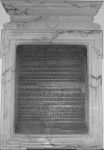The Maclaurin Family
The erection of the Maclaurin memorial in Kilmodan Church is referred to and explained in this extract from the July 1911 edition of the Gartnaval Gazette.
_________________________________________________________________
A Famous Family
In sailing through the beautiful scenery of the Kyles of Bute we have a passing glimpse of romantic Loch Ridden and Glendaruel, just before the steamer rounds the end of Bute on her way to Ardrishaig. The quiet and sequestered manse of Kilmodan, some ten miles up the glen by the Colintraive road, was the birthplace of the famous Maclaurin family. The Rev. John Maclaurin was appointed parish minister of Kilmodan after the Revolution of 1688, no doubt by the influence of the Argyll family, two members of which had suffered on the scaffold in defence of the civil and religious liberties of Scotland. The Maclaurins originally belonged to the island of Tiree, where Daniel, the father of the minister of Kilmodan, was born, but who afterwards removed to Inveraray. We are told that he contributed greatly to restore the prosperity of that small town, which had been completely ruined during the civil wars and the fierce persecution under the latter Stuart kings. It is said that he wrote some ‘Memoirs’ of these troubled times, which unfortunately have been lost.
His son, the Rev. John Maclaurin, after being settled at Kilmodan, proved himself a faithful and zealous evangelical pastor, or as one writer says, “He not only distinguished himself by all the virtues of a faithful and diligent pastor, but has left in the records of his provincial synod lasting monuments of his talents for business, and of public spirit.” He also at the request of the synod of Argyll completed the version of the Psalms into the Gaelic language, which is still used in Highland churches. He married a Miss Cameron, a most estimable lady, by whom he had three sons, John, Daniel, and Colin. Dying in 1698, he left the care of his three boys to their uncle, the Rev. Daniel Maclaurin, minister of Kilfinan, who, on the death of their mother, took an affectionate care of the young orphans, thus proving himself worthy of the solemn trust reposed in him. It has been remarked by a modern writer that the family furnishes an extraordinary instance of hereditary genius. All three brothers attended the University of Glasgow, gaining the esteem not only of their Professors, but of all with whom they came in contact. Unfortunately, Daniel, the second son, died young, after, we are told, “giving proofs of extraordinary genius“. John, the eldest, studied Divinity at Glasgow and Leyden, receiving his licence in 1717 from the Presbytery of Dumbarton. Ordained minister of Luss in 1719, he was in about three years invited to become minister of the Ramshorn church in Glasgow. If Edinburgh cherishes the memory of Colin, who has been styled “the only first-rank native mathematician trained in Great Britain in the eighteenth century“, Glasgow should certainly venerate the memory of John, who has been described as “the most profound and eloquent Scottish theologian of that century, and scarcely less intellectual than Butler“. He it was who, in conjunction with that patriotic and philanthropic old surgeon, Dr. Gordon, urged the building of the Town’s Hospital in 1733, where provision was first made in Scotland for the mentally afflicted. So we see that from this humble beginning sprang the Glasgow Royal Asylum, and indeed all the Asylums in Scotland, Glasgow being truly the ‘Alma Mater’ of them all. So highly valued were his services by the , magistrates of Glasgow that at his death in 1754, at the early age of 6l, the Town Council voted the sum of £100 to his daughter.
Colin, the youngest son, was born at Kilmodan manse in 1698, the year of his father’s death. He graduated M.A. at Glasgow in 1719 and while still very young obtained the chair of mathematics in Marishal College, Aberdeen. He visited London in 1719, where he was admitted a member of the Royal Society. Shortly afterwards, on the strong recommendation of Sir Isaac Newton, who became his firm friend, lie was appointed assistant to Professor Gregory, who then occupied the chair of mathematics at Edinburgh, Sir Isaac, in a letter to the magistrates, generously offering to increase the salary of the young assistant out of his own pocket. On the retiral of Dr. Gregory, he succeeded to the chair. The Maclaurins being strong Whigs, were of course, staunch supporters of the Hanoverian dynasty, and we find Professor Maclaurin strenuously exerting himself in preparing for the defence of Edinburgh against the wild Highland host of Prince Charlie. The hardships which he then underwent and his hurried flight from the town, owing to the cowardice of the Edinburgh volunteers, who refused to man the trenches, brought on an illness from which he shortly afterwards died. His eldest son, who ascended the Scottish bench, by the title of Lord Dreghorn, was the author of several works on law and general literature. We believe the descendants of Professor Maclaurin at the present day occupy prominent positions in the Colonies in the ranks of science and literature.
Quite recently a handsome mural tablet has been erected in the Parish Church of Kilmodan to the memory of this famous family by Sir James Russell, of Edinburgh, and his brother. Lieut.-Colonel A. F. Russell, C.M.G., of the Army Medical Service, both of these gentlemen being natives of the parish.
THE EDITOR

